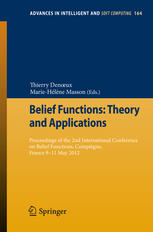

Most ebook files are in PDF format, so you can easily read them using various software such as Foxit Reader or directly on the Google Chrome browser.
Some ebook files are released by publishers in other formats such as .awz, .mobi, .epub, .fb2, etc. You may need to install specific software to read these formats on mobile/PC, such as Calibre.
Please read the tutorial at this link: https://ebookbell.com/faq
We offer FREE conversion to the popular formats you request; however, this may take some time. Therefore, right after payment, please email us, and we will try to provide the service as quickly as possible.
For some exceptional file formats or broken links (if any), please refrain from opening any disputes. Instead, email us first, and we will try to assist within a maximum of 6 hours.
EbookBell Team

4.4
12 reviewsThe theory of belief functions, also known as evidence theory or Dempster-Shafer theory, was first introduced by Arthur P. Dempster in the context of statistical inference, and was later developed by Glenn Shafer as a general framework for modeling epistemic uncertainty. These early contributions have been the starting points of many important developments, including the Transferable Belief Model and the Theory of Hints. The theory of belief functions is now well established as a general framework for reasoning with uncertainty, and has well understood connections to other frameworks such as probability, possibility and imprecise probability theories.
This volume contains the proceedings of the 2nd International Conference on Belief Functions that was held in Compiègne, France on 9-11 May 2012. It gathers 51 contributions describing recent developments both on theoretical issues (including approximation methods, combination rules, continuous belief functions, graphical models and independence concepts) and applications in various areas including classification, image processing, statistics and intelligent vehicles.